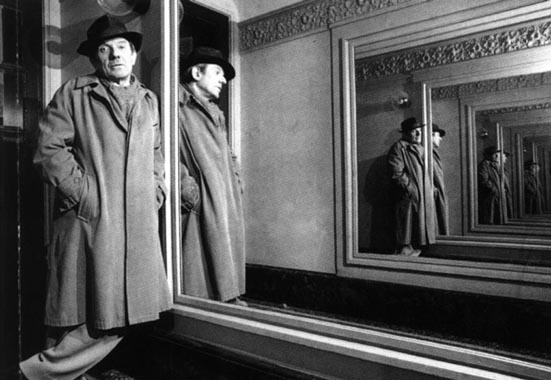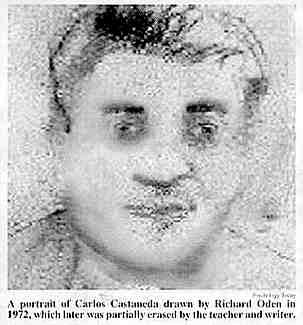![]()

Obviously many readers will be familiar with this material, but in the interests of accumulating resources on the site, I've reproduced below some of the key passages in A Thousand Plateaus in which D/G invoke Castaneda.
From '587 BC-AD 70: On Several Regimes of Signs' (138-39)
'One of the things of profound interest in Castaneda's books, under the influence of drugs, or other things, and of a change in atmosphere, is precisely that they show how the Indian manages to combat the mechanisms of interpretation and instill in the disciple a presignifying semiotic, or even an asignifying diagram: Stop! You're making me tired! Experiment, don't signify and interpret! Find your own place, territorialities, deterritorializations, regime, lines of flight! Semiotize yourself instead of rooting around in your prefab childhood and Western semiology. "Don Juan stated that in order to arrive at 'seeing' one first had to 'stop the world'. 'Stopping the world' was indeed an appropriate rendition of certain states of awareness in which the reality of everyday life is altered because the flow of interpretation, which ordinarily runs uninterruptedly, has been stopped by a set of circumstances alien to the flow." '
From 'How Do You Make Yourself a Body without Organs?' (161-2)
'In the course of Castaneda's books, the reader may begin to doubt the existence of the Indian Don Juan, and many other things besides. But that has no importance. So much the better if the books are a syncretism rather than an ethnographical study, and the protocol of an experiment rather than an account of an initiation. The fourth book, Tales of Power, is about the living distinction between the "Tonal" and the "Nagual." The tonal seems to cover many disparate things: It is the organism, and also all that is oraganized and organizing; but it is also signifiance, and all that is signifying or signified, all that is susceptible to interpretation, explanation, all that is memorizable, in the form of something recalling something else; finally it is the Self (Moi), the subject, the historical, social or individual person. In short, the tonal is everything, including God, the judgment of God, since it "makes up the rules by which it apprehends the world. So, in a manner of speaking, it creates the world." Yet the tonal is only an island. For the nagual is also everything. And it is the same everything, but under such conditions that the body without organs has replaced the organism and experimentation has replaced all interpretation, for which it no longer has any use. Flows of intensity, their fluids, their fibers, their continuums and conjunctions of affects, the wind, fine segmentation, microperceptions, have replaced the world of the subject. Becomings, becoming-animal, becomings-molecular, have replaced history, individual or general. IN the fact, the tonal is not as disparate as it seems: it includes all of the strata and everything that can be ascribed to the strata, the organization of the organism, the interpretations and explanations of the signifiable, the movements of signification. The nagual, on the contrary, dismantles the strata. It is no longer an organism that functions but a BwO that is constructed. No longer are there acts to explain, dreams or phantasies to interpret, childhood memories to recall, words to make signify; instead, there are colours and sounds, becomings and intensities (and when you become-dog, don't ask if the dog you are playing with is a dream or a reality, "if it is your goddamn mother" or something else entirely). There is no longer a Self [Moi] that feels, acts, and recalls; there is "glowing fog, a dark yellow mist" that has affects and experiences movements, speeds. The important thing is not to dismantle the tonal by destroying it all of a sudden. You have to diminish it, shrink it, clean it, and that only at certain moments. You have to keep it in oder to survive, to ward off the assault of the nagual. For a nagual that erupts, that destroys the tonal, a body without organs that shatters the strata, turns immediately into body of nothingness, pure self-destruction, whose only outcome is death: "The tonal must be protected at all costs." '
From '1933: Micropolitics and Segmentarity', 227
'According to Nietzsche's Zarathustra and Castaneda's Indian Don Juan, there are three or even four dangers: first, Fear, then Clarity, then Power, and finally, the great Disgust, the longing to kill and to die, the Passion for abolition.'
From '1730: Becoming Intense, Becoming-Animal...', 248-249
'If the experimentation with drugs has left its mark on everyone, even nonusers, it is because it changed the perceptive coordinates of space-time and introduced us to a universe of microperceptions in which becomings-molecular take over from becomings-animal leave off. Carlos Castaneda's books clearly illustrate this evolution, or rather this involution, in which the affects of a becoming-dog, for example, are succeeded by those of a becoming-molecular, microperceptions of water, air, etc. A man totters from one door to the next and disappears into thin air: "All I can tell you is that we are fluid, luminous beings made of fibers." All so-called initiatory journeys include these thresholds and doors where becoming itself becomes, and where one changes becoming depending on the "hour" of the world, the circles of hell, or the stages of a journey that sets scales, forms, and cries in variation. From the howling of animals to the wailing of elements and particles.'
282
'All drugs fundamentally concern speeds, and modifications of speed. What allows us to describe an overll Drug assemblage in spite of the differences between drugs is a line of perceptive causality that makes it so that (1) the imperceptible is perceived; (2) perception is molecular; (3) desire directly invests the perception and the perceived. The Americans of the beat generation had already embarked on this path, and spoke of a molecular revolution specific to drugs. Then came Castaneda's broad synthesis.'

Maybe we should use the concealed text option for long posts? Having it all up front is a bit disruptive.
(Pix are great)
Great posts, great blog.
You might find this interesting:
‘Memories of a sorcerer’: notes on Gilles Deleuze-Felix Guattari, Austin Osman Spare and Anomalous Sorceries; in The Journal for the Academic Study of Magic, Issue 1, 2003. Article Availiable: http://homepage.ntlworld.com/matt.lee7/Deleuze%20and%20sorcery%20with%20additional%20footnotes.rtf
Best,
C
Posted by: Craig at July 23, 2004 01:25 PMthanks for thelink, I enjoyed reading this, a model of clarity and a fascinating connection to make between D/G and Spare.
Another link ppl here might be interested in :
http://www.biroco.com (especially the impressive 'Kaos' magazine)
is true that no pic of Castaneda can be taken as a true one ?
Posted by: Kihei at July 24, 2004 09:08 PM